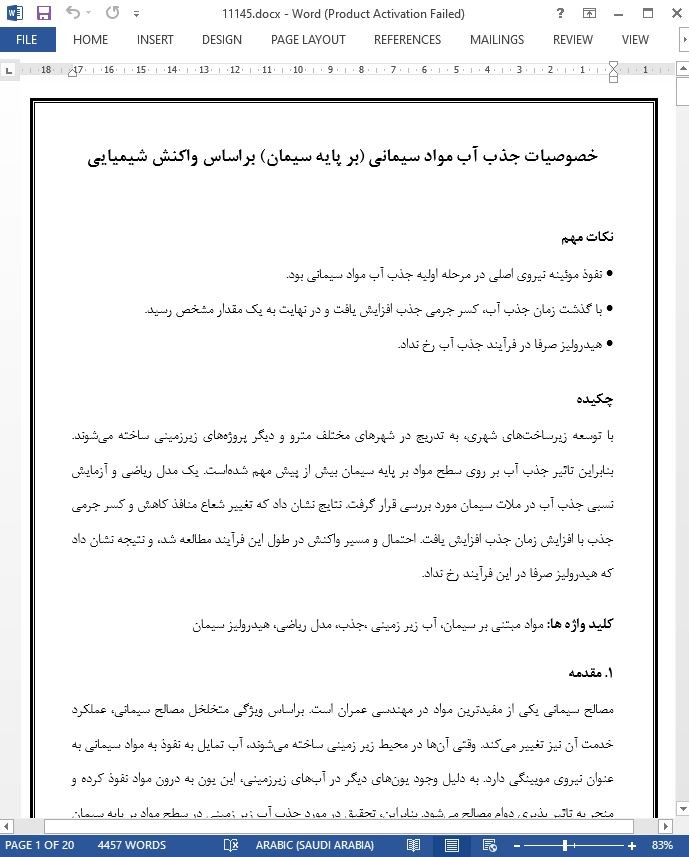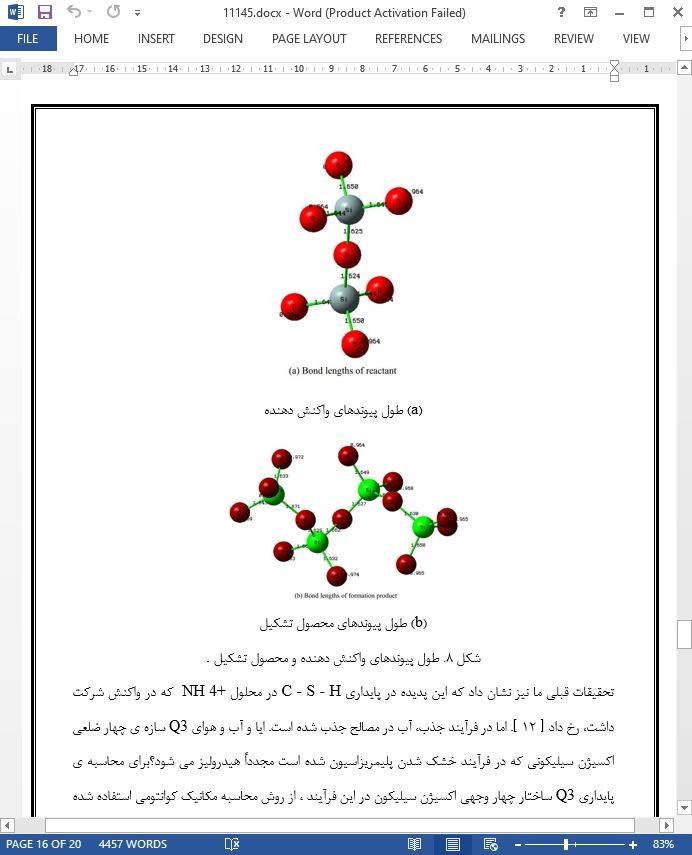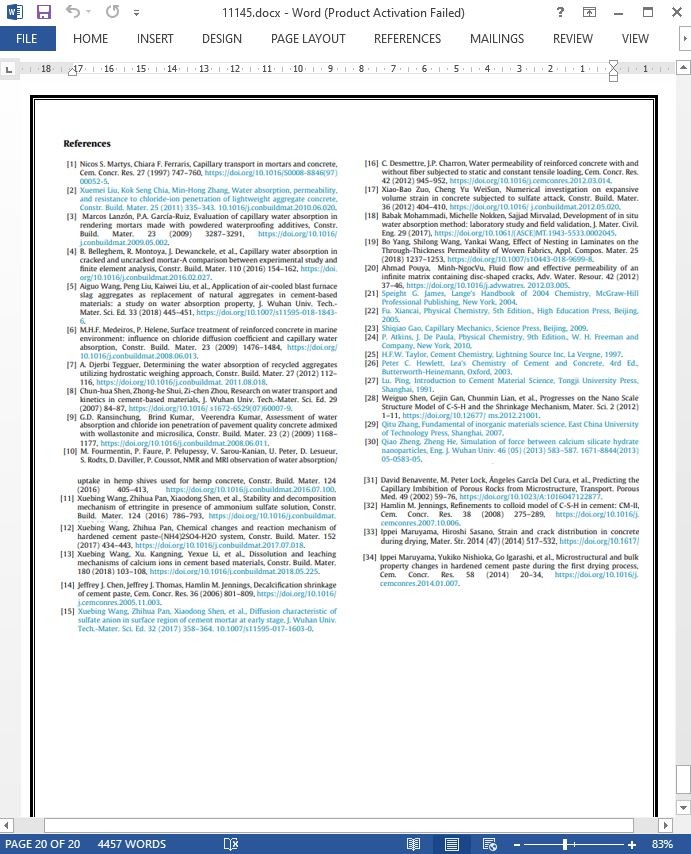
خصوصیات جذب آب مواد سیمانی (بر پایه سیمان) بر اساس واکنش شیمیایی
چکیده
با توسعه زیرساختهای شهری، به تدریج در شهرهای مختلف مترو و دیگر پروژههای زیرزمینی ساخته میشوند. بنابراین تاثیر جذب آب بر روی سطح مواد بر پایه سیمان بیش از پیش مهم شدهاست. یک مدل ریاضی و آزمایش نسبی جذب آب در ملات سیمان مورد بررسی قرار گرفت. نتایج نشان داد که تغییر شعاع منافذ کاهش و کسر جرمی جذب با افزایش زمان جذب افزایش یافت. احتمال و مسیر واکنش در طول این فرآیند مطالعه شد، و نتیجه نشان داد که هیدرولیز صرفا در این فرآیند رخ نداد.
۱. مقدمه
مصالح سیمانی یکی از مفیدترین مواد در مهندسی عمران است. براساس ویژگی متخلخل مصالح سیمانی، عملکرد خدمت آن نیز تغییر میکند. وقتی آنها در محیط زیر زمینی ساخته میشوند، آب تمایل به نفوذ به مواد سیمانی به عنوان نیروی مویینگی دارد. به دلیل وجود یونهای دیگر در آبهای زیرزمینی، این یون به درون مواد نفوذ کرده و منجر به تاثیر پذیری دوام مصالح میشود. بنابراین، تحقیق در مورد جذب آب زیر زمینی در سطح مواد بر پایه سیمان مهم است.
۵. نتیجهگیری
براساس قانون Hagen - Poiseuille و روش مکانیک کوانتومی، یک مدل ریاضی از جذب آب مواد سیمانی با تحلیل واکنش شیمیایی در طول فرآیند جذب آب ارایه شدهاست.
(۱) در مرحله اولیه جذب آب، نفوذ مویینگی نیروی اصلی در جذب آب مواد بر پایه سیمان بود. اندازه منفذ ملات سیمان با کاهش w/c کم شد و در نهایت به یک مقدار ثابت کاهش یافت.
(۲) کسر جرمی جذب با گذشت زمان به سرعت افزایش یافت و در نهایت به یک مقدار مشخص رسید. عمق نفوذ نیز با زمان جذب آب افزایش یافت، اما این روند با تغییر کیفیت جریان یکسان نبود و در ابتدا به آرامی و در نهایت به سرعت افزایش یافت.
(۳) طبق روش مکانیک کوانتومی، فرآیند مرطوب سازی مواد بر پایه سیمان به خودی خود رخ داد، اما هیدرولیز صرفا در فرآیند جذب آب رخ نداد.
Abstract
With the development of urban infrastructure, subway and other underground projects are gradually being constructed in various cities. The influence of water absorption on surface of cement-based materials has therefore become more and more important. A mathematical model and the relative experiment of water absorption in cement mortar were investigated. The results showed that the change of radius of pore was decreased and absorption mass fraction was increased with the increased of absorption time. The possibility and direction of reaction during this process were studied, and the result showed that hydrolysis was not merely occurred in this process.
1. Introduction
Cement-based material is one of the most useful materials in civil engineering. Based on the characteristic of porous of cement-based material, its service performance change accordingly. When they are built in the underground environment, water tends to penetrate cement-based materials as capillary force. Because of existence of other ions in groundwater, it penetrated into the materials and lead to be affected of durability of materials. Therefore, the research of absorption of underground water on surface of cement-based materials is important.
5. Conclusions
Based on the Hagen-Poiseuille law and quantum mechanics method, a mathematical model of water absorption of cementbased material was established by analyzing the chemical reaction during the process of water absorption.
(1) In the early stage of water absorption, capillary permeation was the main force in water absorption of cement-based materials. The pore size of cement mortar was decreased with the decrease of w/c and finally reduced to a fixed value.
(2) Absorption mass fraction was increased with time, it was increased rapidly and finally reached to a certain content. The depth of penetration was also increased with the water absorption time, but the trend was not same with change of flow quality, it was increased slowly and finally change to rapidly.
(3) According to quantum mechanics method, the wetting process of cement based material was happened spontaneous, but hydrolysis was not merely occurred in the process of water absorption.
نکات مهم
چکیده
۱. مقدمه
۲. فرآیند تئوری مدل جذب
2.1. محاسبه تئوری جذب
۳. مواد و روشها
3.1. مواد خام
۳.۲. آمادهسازی ملات سیمان
۳. ۳. روش اندازهگیری
۴. نتایج و بحث
4.1. تغییر ساختار منافذ نمونه در زمانهای مختلف غوطهوری
۴.۲. رابطه بین کسر جرمی جذب و زمان
۴.۳. مدل شیمیایی فرآیند جذب
۵. نتیجهگیری
Highlights
Abstract
1. Introduction
2. Theoretical process of absorption model
2.1. Theoretical calculation of absorption
3. Materials and methods
3.1. Raw material
3.2. Preparation of cement mortar
3.3. Measurement method
4. Results and discussion
4.1. Changes of pore structure of sample at different soaking time
4.2. The relationship between absorption mass fraction and time
4.3. Chemical model of absorption process
5. Conclusions
- ترجمه فارسی مقاله با فرمت ورد (word) با قابلیت ویرایش، بدون آرم سایت ای ترجمه
- ترجمه فارسی مقاله با فرمت pdf، بدون آرم سایت ای ترجمه



